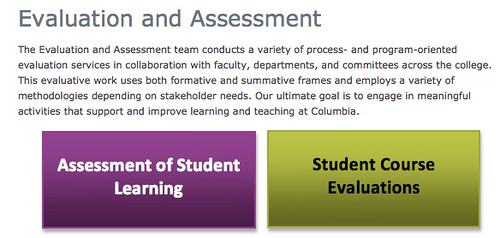
The Importance of Student Evaluations
[flickr id=”8229211744″ thumbnail=”medium” overlay=”true” size=”original” group=”” align=”center”]
It’s that time of year again. I keep seeing reminders for submitting my Student Evaluations for the classes that I am taking. With everything that I’ve got going on right now and considering that my inbox (after the Thanksgiving break) was almost two pages long…it is easy to forget or to just not do the evaluation. It’s another thing on the “To-Do” list and can seem time consuming and tedious, but evaluations are so very important.
When you are assigned your first class as a Graduate Student Instructor (GSI), you will see a “Faculty” tab pop up on your OASIS Homepage. OASIS is Columbia’s official campus portal, the place where you can view course offerings, register for classes, apply for scholarships, view your book list, and complete your own student evaluations for the classes that you are taking, and it’s the place where your students will access their evaluations for your class. The “Faculty” tab gives you access to a course page for the class you are teaching where you can upload your syllabus and course documents, set up a grade book, and view your class roster. Basically, it’s an important tool whether you are taking or teaching a class, and I use it daily.
[flickr id=”8228078473″ thumbnail=”medium” overlay=”true” size=”original” group=”” align=”center”]
But, back to evaluations. Are they really that important? Do people even read them? The answer is: YES! I always encourage my students to fill out both the online evaluations (accessed via OASIS and developed by Academic Affairs) and the paper evaluations that I hand out in class (these are developed by the English Department). It is important to stress to students that they should be filling out BOTH evaluations and, as a student, to fill out and take each evaluation seriously.
I really do appreciate when students take the time to write comments and not just check boxes or circle “agree,” or “disagree.” I also take the time to write comments for my instructors, because it’s nice to know when you’re doing a good job and also when something in the classroom isn’t working. There are students who will say that the class was their favorite class or that they learned skills that they will take with them to other classes and even outside of the classroom. There are also students who may give suggestions on Peer Review Workshops and specific details of the class from a student perspective that I have personally taken into consideration and made changes for future classes. That’s valuable feedback, and it’s good to know that students are taking away valuable skills and information from the classes they are taking, and that they are given the chance to speak up if they have suggestions for improvement.
Here’s a video that the Evaluations and Assessment Offices at Columbia put together with a few instructors from several departments on campus speaking about the importance of Student Evaluations.
[youtube]http://youtu.be/yx5t8aqEcFg[/youtube]
Columbia’s Evaluations and Assessment office is housed within the Academic Affairs department, and they take what they do very seriously, allowing teachers to add course-specific questions to their evaluations. They also send out reminders to students to fill out the evaluations, and to instructors, notifying them about how many students are actually filling out the online evaluations. These emails may seem to be redundant or time consuming, but the goal behind the email is to improve courses and give students a chance to voice their concerns and their successes. This is a necessary task and helps to ensure that the courses being taught at any university are enhancing students’ education and experience, and preparing them for success once they graduate.
